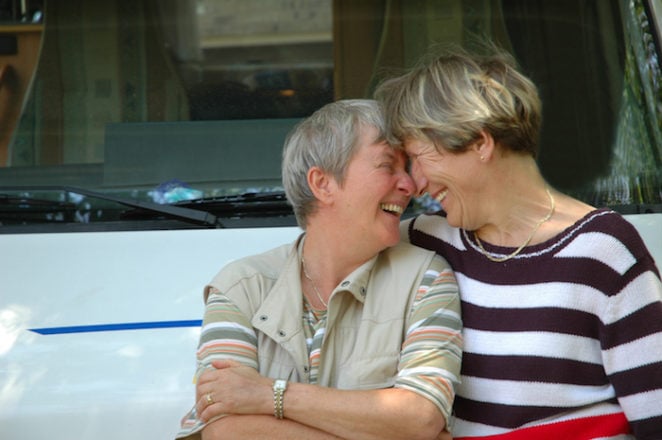
For the first time, California has launched a statewide online survey of LGBTQ+ older adults.
“This is an opportunity for LGBTQIA+ older adults to share their perspectives, experiences, needs, and priorities to help inform state policies and programs for older adults,” Susan DeMarois, director of the California Department of Aging, said in a statement. “There’s no baseline data on the aging experiences and needs of older LGBTQIA+ Californians, so survey responses will help paint a current and comprehensive portrait of this community.” Photo: iStock/EyeJoy
For the first time, California has launched a statewide online survey of LGBTQ+ older adults.
“This is an opportunity for LGBTQIA+ older adults to share their perspectives, experiences, needs, and priorities to help inform state policies and programs for older adults,” Susan DeMarois, director of the California Department of Aging, said in a statement. “There’s no baseline data on the aging experiences and needs of older LGBTQIA+ Californians, so survey responses will help paint a current and comprehensive portrait of this community.”
Anyone 50 and older who identifies as part of the LGBTQ+ community and lives in California can fill out the survey, which is anonymous and should take approximately 20 minutes.
It will close March 31 and is available in English, Spanish, Tagalog, and Chinese.
Carolyn Weathers, Long Beach lesbian activist, witnessed gay history
Because the U.S. Census doesn’t ask about people’s sexual orientation or gender identity (also known as SOGI) during its decennial count of the nation’s population, federal data doesn’t exist on the number of LGBTQ+ Californians 50 and older.
But, the Williams Institute, UCLA School of Law think tank, released a report last year estimating the number of LGBTQ adults age 18 and older living in California was approximately 1.5 million.
The LGBTQ+ adult population in the U.S. is estimated to be approximately 14 million, with people 50 and older being 4.5% of the total, according to the Williams Institute.
Despite playing a proud and central role in the history of California and communities across the state, the LGBTQ+ population has faced stigma and barriers to opportunity, support, and services.
Officials want to know about those stigmas and barriers. The survey’s goal is to identify gaps in the needs of older LGBTQ+ Californianas and highlight priorities for the Department of Aging and lawmakers in Sacramento.
In the survey, which is anonymous, respondents are asked a variety of topics: health issues and insurance coverage, living arrangements, social activities, relationships, housing, income, caregiving, food assistance.
The questions also inquire about HIV status, transportation, employment, and end-of-life matters.
The survey results also will help the state’s Master Plan for Aging, a 10-year blueprint that sets goals for the aging department during each two-year session in the legislature.
The age range in the survey is broad, 50 and older, because the agency wants to gather information from people at different stages of their older adult lives.
The agency also wants to reach a geographically diverse group of respondents. As a result, it has partnered with LGBTQ+ senior service providers in urban centers and its network of 33 agencies to help spread the word about the survey.
The Department of Aging allocated $899,304 for the survey and will report findings later this year.
